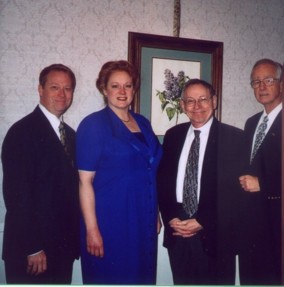
Information on the Wharton Tea and Opera
Sentinel for Jan. 22, 2004
Opera Creators Preview New Work at High Tea
By Elinor Reiss
| Composer Myron Fink and librettist Don Moreland gave opera buffs and book lovers a peek at their new opera, _Edith Wharton_ at a Victorian High Tea Dec. 29 at the Horton Grand Hotel. The two, assisted by soprano Patricia McAfee and tenor Richard Geiler of the San Diego Opera, kept the audience spellbound as they unfurled the life of America’s pre-eminent woman of letters. Fink explained the opera-writing process, Moreland read from the libretto, and McAfee as Edith Wharton and Geiler as her lover, Morton Fullerton, made for a thrilling look at the creative process. |  |
The team of Fink and Moreland has spanned four decades and five operas since
they met at the University of Illinois as students Both Chicago natives, Fink,
a resident of Scripps Ranch, moved to San Diego in 1991. After the 1997 premiere
of _The Conquistador_ at the San Diego Opera, Moreland also relocated to San
Diego and now lives in Rancho Bernardo.
Fink was responsible for introducing the Conquistador to Moreland, but Moreland
brought Edith Wharton into their lives. While working on _El Conquistador_,
he was reading through Wharton’s novels with an eye toward the next project,
but it was the author herself who ended up capturing his imagination. “You
have to read this woman’s life!” he told his writing partner. Fink,
equally moved and fascinated, agreed she was the stuff of grand opera. Work
on the new opera began immediately.
“You know what they say,” Moreland told the rapt listeners. “Your
favorite piece is the one you’re going to work on next.”
Fink said he tells those who ask about creating an opera, “the words come
first… then comes the composition of music.” Fink credits the librettist
with the more difficult job.
“The job of librettist is to go off into the jungle and cut away the vines.
By the time the composer comes along, it’s like a superhighway!”
The two men gave an impassioned description of the world of Edith Wharton but
invited the audience to ”jump in any time to correct our mistakes.”
Several members of the Edith Wharton Society, in San Diego for the national
Modern Language Association conference, had eagerly accepted an invitation to
this special event. Also in attendance were people who developed an interest
in Edith Wharton after visiting her estate in Lenox, Massachusetts.
The opera begins with Wharton’s life unfolding as in a dream, emerging
from memories and her subconscious, as she looks through a scrapbook filled
with faces, places, covers, of her books, press clippings, and other reminders
of the past.
The audience sees a woman born into a privileged American family in 1862, eventually
taking her place within the highest social and literary circles in New York,
Boston, Washington, D.C., London, and Paris. But the great woman, friend to
the most famous personages of her time, started her life differently. As a child
she was subjected to the rejection and criticism of her mother and constant
taunting of her brothers. She entered into a loveless marriage that was never
consummated over 21 years. When Morton Fullerton came into her life, though
she suspected this would not be a happy match, she was ripe for the relationship.
Morton sings: “I was a man who knew how to please women, I knew how to
wait, what to say, what not to say… I knew how to make a woman want me
until she could bear it no longer. And, unable to resist herself, Would give
herself to me.”
The lovestruck Edith reveals: “We fulfilled each other. Oh, those days,
those hours. My heart dissolved. When he entered a room flames rippled over
me. Every drop of blood whispered: ‘He’s mine, he’s mine!’…
His indifference in the end, his cruel silences, My jealousy, my fury to be
so abandoned, Ad not just for other women! I could not bear it. Still…I
forgave him… for he had unlocked my heart.”
An internationally recognized woman of letters, praised for landmark books on
interior decoration and architecture as well as her novels, Wharton received
a Pulitzer Prize for _The Age of Innocence_. Many of her books have been made
into motion pictures. Characters from three, _Age of Innocence_, _Ethan Frome_,
and _House of Mirth_, help tell her story in the opera. The opera ends on a
note of triumph as Wharton rises above her fear and despair and begins her final
novel, _The Buccaneers_.
The Victorian High Tea, an elegant afternoon of tea, sherry, dainty sandwiches,
and fancy pastries, was a high point of the holiday season for those attending,
reminiscent of a drawing room scene that might have come from the pages of an
Edith Wharton novel.
Other operas by Fink and Moreland include a recent opera for children, _Animalopera_,
_Judith and Holofernes__Chinchilla_, and _The Boor_.